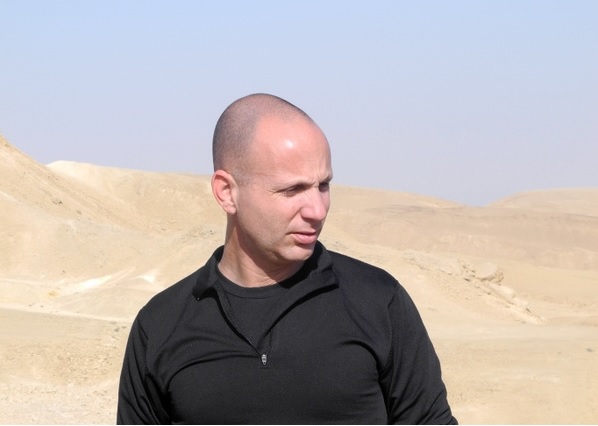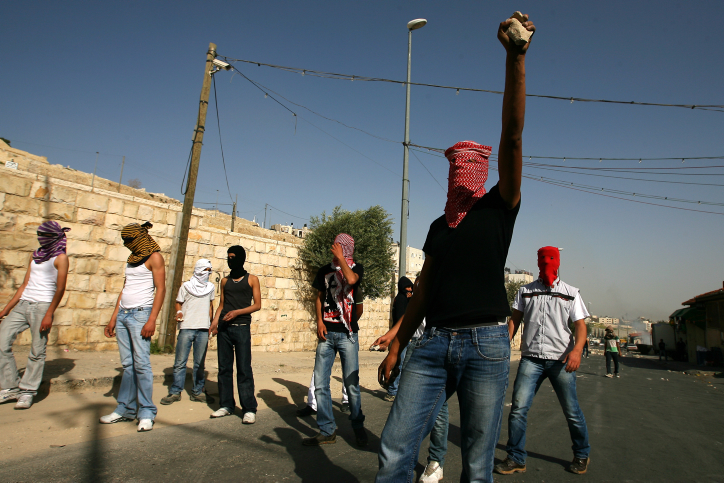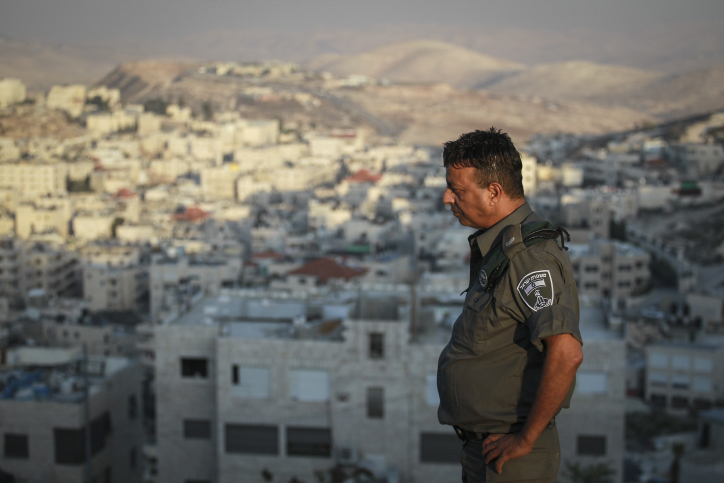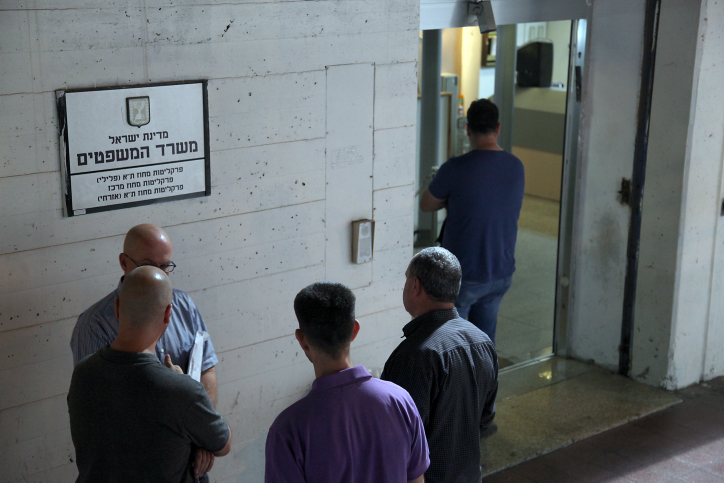Dakar Eilat, a veteran of Israel’s police and prison system, explains how to restore law and order in East Jerusalem.
Dakar Eilat, a former Mista’arev and senior official in the Prisons Administration, has a solution for putting out the fires of rioting · Border Guard officers in the field complain that their hands are tied, Eilat disputes this: “They have enough leeway within the law to handle events” · Eilat lays the blame for the ineffectiveness of the police at the feet of government legal advisors and a government which has forgotten that it is sovereign · An interview with a man who served on the front lines

In 1998, when President Clinton was coming to visit Israel, the Palestinians tried to pressure Israel to release prisoners as part of the political process. “Pressure” for the Palestinians meant Molotov cocktails, stone throwing and violent demonstrations as part of what was called the “prisoners’ intifada” which lasted for three weeks. At the time, Dakar Eilat, now a retired Junior Commissioner (equivalent to a Colonel in the IDF), was an intelligence officer in the Mista’arvim unit in Jerusalem. “We led the handling of events and we hit them head on,” he tells ‘Mida’. “That is, any point where an event just started, or there was even a feeling of rioting ‘in the air’, we immediately brought in forces at an intensive level to conduct arrests…with a high level of determination and aggressiveness.”
“When you face violent events, you need to deal with them aggressively. You can’t be nice,” Eilat says, recalling other successful actions. “One of these was the Shuafat refugee camp, which is a very violent place,” he relates.
“We went in very hard, which ended with a situation of ‘zero incidents’. Another example happened a year afterward. During Ramadan, on a regular basis, Egged bus lines no. 1 and 2 would avoid the Sultan Suleiman area because of stone throwing. We decided this is something that can’t go on. With Egged’s agreement, we took a protected bus and were in the area in massive numbers.
Anyone who lifted a stone, moved a stone or looked at a stone was arrested, but not on the charge of throwing stones – which is a misdemeanor – but on the charge of throwing stones at traffic lanes while endangering human life, which contains larger sentences and applies to children as well. We did everything we can to eliminate this phenomenon. Suddenly people were sitting in jail for a year or two for stone throwing, something which didn’t happen before, and they started to think twice if it’s worth it for them. It started as our idea, but soon everyone was on board – including the justice system.” And it worked.
Responses need to be focused
Dakar Eilat is only 45 but has already seen a lot in life. He served in the Paratroopers and was in the elite IDF Duvdevan unit when it was founded. He then moved on to become a detective in the Tel Aviv area, and from there went on to be a Mista’arev in East Jerusalem. “I know it inside and out. I was a fighter, team commander and intelligence officer of the unit there. I went to a job in operational intelligence in the Yamam and after a few years they took me to establish and command the ‘Masada’ unit in the Prison Service – a unit which handles securing and rescuing hostages and knows how to deal with violent incidents with non-lethal methods (2003-2007).”
Eilat knows the terrorists very well, and not just from the end of a gun. He commanded the Gilboa prison for three and a half years, primarily with Israeli security prisoners: “All the East Jerusalemites sat by me, and I had thousands of conversation hours with them.” After doing two degrees, he also commanded the Hadarim prison. “After a combination of personal and professional matters, I decided it’s time to leave. Right now I’m a freelancer, providing consulting on anything relating to jails, imprisonment, aggressive policing and dealing with radical Islam. In the country and in the world,” he tells ‘Mida’.

Mr. Eilat, you have a lot of experience in dealing with violent incidents which are motivated by nationalism. What do you think the state of Israel is doing wrong, especially in the context of East Jerusalem?
“Responses to violence have to be focused. One of the ways in which we go wrong is collective punishment – everyone in the area is harmed and the effect of punishment is weakened. We come with demands to the locals to deal with events, and that’s ridiculous. It’s as if there were a plague of traffic accidents on French Hill [Jerusalem neighborhood], and then you go to the local neighborhood board and tell them to punish the perpetrators.”
“A response to events needs to be surgical, even if painful. For instance, when I was a prison commander, I made it very clear to the prisoners that they can’t smuggle cellphones in, and indeed for a long time they didn’t. At the time, the Prison Service was used to punishing the whole block in which a contraband cellphone was found with one less hour in the yard, and then everything was calm.”
“We understood there was a problem of cellphone smuggling and we immediately began a massive search with hundreds of guards until we found all of them. The prisoners were not willing to say who smuggled them, so I punished them by denying them fans for four months – July-August-September-October – and this in the Gilboa prison in the Jezreel Valley. It’s disproportionate punishment, but it made the prisoners understand who’s in charge and who you don’t mess with.”
“We don’t understand that we’re sovereign. We don’t understand that we’re the strong ones. Israel is not some fly-by-bight state, and the Arab world sees this as well. The Arabs understand that when you’re sovereign, if they break the law you have to respond with force. If you don’t do it, it’s perceived as weakness.”
You don’t think that a strong response will lead to more escalation and violence, as many people in Israel are arguing?
“In the short term, the Arabs will certainly be angry, but the minute you go in strong, intensively and consistently, they’ll understand that you’re sovereign and that this is your legitimate right. After 2, 3, 4 days, they’ll lower the flames. Take the Marmara, for instance: we responded and stopped the flotilla. In the Turkish media you saw opposition voices which justified the Israeli response – ‘they said don’t pass, we did and the Israelis responded’. The minute we started to apologize they started laughing at us. The west also sees us as a strong state, but the minute we start to excuse, apologize and talk about how moral we are…we’re seen as not believable. If you intend to apply force – apply force. Don’t apologize, don’t be a crybaby.”
Sovereignty is not just policing
But policing, Eilat explains, can’t work on its own. Sovereignty includes other factors as well: “A department head at the Shabak once told me that in Jerusalem we use the stick and axe system. We forgot the carrot. What’s the carrot? Alongside policing we need to operate a program which will invest resources in education, culture, infrastructure, roads, sanitation, employment – but not one run by an Israeli, but by themselves.”
“It’s not an excuse for violence, but there are political bodies among the Arab population who take advantage of the situation. The Arab masses are quickly drawn in, that’s the mentality of that society. Does that mean it’s OK? No. Does that mean that if you respond, they’ll get mad? Yes. But it also means that they’ll understand that you’re the sovereign and that they can’t do whatever they want. Why do you see so few riots in Ramallah? Because they know that if they do, the Palestinian police will tear them apart.”
“What happens now? We go in to Jerusalem with huge forces, write tickets, fines – and what of the carrot? Where’s the sanitation? Where’s the investment in the area? Where are the plans for developing residential areas? Today in east Jerusalem there’s almost no city plan, except for Beit Hanina. Take Beit Hanina vs. Issawiya. In absolute numbers before Protective Edge, Issawiya had ten times as many violent incidents as Beit Hanina. You think this has nothing to do with the fact that they invested in Beit Hanina’s infrastructure, train lines, roads and schools?”
“You know that according to Basic Law: Jerusalem the state cannot grant any sovereign authority to anyone save the national government and the Jerusalem municipality. So why does the municipality allow the schools of the Waqf and the Palestinian Authority to operate in East Jerusalem? This is a non-policy. There is an application of the law to the Arab neighborhoods we included in the wall, we still see them as part as part of Jerusalem and there is no sovereign authority there. Nothing.”

A year ago, Eilat initiated a proposal which was accepted by the Justice Ministry but got stuck during Protective Edge. “The idea was very simple: build an operational headquarters, in which you combine a number of bodies – administrative, which for our purposes is the municipality, a municipal center, and center for assistance, sanitation, infrastructure and other fields. See to it that if you have to remove a dead cat from the street, you don’t need to do it with a Border Guard escort. You know that today Magen David Adom can’t go into Issawiyah without the Border Guard? Those are the police instructions! If there’s a pothole, the municipality can’t go in without the police. In this project you need to collect and invest a lot of money, and make it a combined effort of relevant ministries such as Justice, Culture and Health.”
“In addition, don’t complain about every event to the locals and demand they handle it. Deal with it yourself – catch the perpetrators, punish them, blow up terrorists’ houses. But handle their infrastructure as well so they know they have where to aim for. You know that today they haven’t built a single neighborhood in Issawiya? They let them build illegally, even though there are open areas there and the locals want someone to build them up. No-one dares make a city plan there.”
How could such a plan work in the field? It’s hard to believe that you can demolish all the illegal construction in Jerusalem.
“I say – retroactively legalize existing construction and start from scratch. Define the safety conditions which are required in every building that wants to be legalized. Anyone who doesn’t want to do this, his house will be destroyed within two years. Why does the municipality not want to legalize houses? Because it’s afraid that if a safety disaster happens, they’ll be blamed. And if something happens now, they won’t come hounding the municipality? On the other hand, they say, it’s not worth investing in these places which might end up in Palestinian hands.”
When the IDF Legal Advisor says “No”
During the violent riots over the past few weeks, various police and Border Guard officers in the field complained that their hands are tied. But Eilat doesn’t think this is the case. “They have enough leeway within the law to handle events. There’s also enough equipment and forces to do it.” According to him, the problem can be broken into three main parts:
- Understanding how to handle disturbances: “Not every force you throw into the fray knows how to deal with disturbances. For instance, you need to know that most Border Guards are regular policing forces. Dealing with disturbances is a specialized task, but here they dismiss the skill.”
- Means, and the legitimacy to use them: “The means come with training. In Israel, they like the generic – a force that knows how to do everything. The minute there are no disturbances, they send the special police forces on regular police duties. But it’s important to have designated forces. Another problem in this part is that legal advisors harm the operational capabilities of the existing means. Let’s say you come and say you have a means which is effective for certain ranges. The legal advisors come and say that it might be effective but it’s dangerous. So what’s better? Using live fire? Look at the Marmara and the use of paintball guns – better to use (non-lethal) strong methods to stop violent demonstrations rather than let it deteriorate to a live fire situation.”
- Training: “Dealing with violent incidents is a specialized profession. The social protests in Tel Aviv – what is known as a ‘disturbance’ – is not the same thing as riots in Shuafat, where you need to use aggressive means to neutralize events. When you take forces to deal with the social protest today and events in Shuafat tomorrow, they get confused. When it comes to disturbances, there’s a difference between merely moving people away and neutralizing a person and arresting him. To move people away, you use stun grenades, rubber bullets and so on. But if you want to arrest someone, you have to use means that will deny their movement.”
Eilat consistently goes back to the problem of the legal advisors. These, he says, have crossed the line, and today they are more hindrance than help.
“Let’s say there’s a means that’s effective for a meter to ten meters. The IDF legal advisors come and say “No” – we approve the use of the means only between ten and thirty meters. Why? Because it hurts. But [if you use it for 10-30 meters] you only anger a man and don’t neutralize him. Then the commander in the field says – I have no legal approval so I don’t OK use of the means. The legal people are tying down the present operational capabilities, and the commanders forget that their job is to take decisions to carry out the mission even if the legal advisor doesn’t give the OK. When did it become the legal advisor’s job to make the decisions? His job is to advise. Today commanders ask the OK of the legal people because they threaten that otherwise they won’t back them up in case of a lawsuit or indictment.”
“If the Knesset is sovereign then it needs to pass laws which allow getting the job done in the field. By existing law you can do everything, if you train people properly.”

When people talk about means of dispersing violence in demonstrations, there’s one event that always comes up: the events of October 2000 and the Orr Commission. Do you think this was a turning point in the ability of the police to deal with violent incidents?
“The Orr Commission did one major thing – it placed the entire burden of responsibility on the commanders in the field, that’s all. The politicians are not responsible, the brass is not responsible, and it doesn’t matter if the commander in the field wasn’t properly trained or equipped. Today the situation is that commanders are scared.”
“Let me give you an example. Half a year ago, there was an event where locals went down form Umm el-Fahm to Wadi Ara and blocked the road. The Yasam came from behind to observe them. The demonstration was illegal, with no permits. I stood next to them and I couldn’t believe it – the Israeli Police didn’t dare mess with them. They let them blow off steam and told them ‘calm down, and let’s talk about this’. A commander tells himself, justifiably, that he wants to advance or at least finish his term. Who will back him up? The brass isn’t responsible, the staff isn’t responsible and who will pay the price in the end?”
Eilat experienced this pass-the-buck reality himself. “In 2007, when I was in the ‘Masada’ unit, we had an event of a mass riot in the Ktzi’ot prison. In this event a man was killed, and I intentionally say ‘killed’ because even today we don’t know exactly what happened. Understand – we were 21 fighters against 1,000 rioters, all terrorists. ‘Masada’ performed splendidly. They deserved medals. We ended the event with one killed and 15 lightly wounded, and this was a much more violent incident than the Marmara. By orders of magnitude. In the end, I went through the court system for five years, and no-one backed me up. The deceased’s family filed a lawsuit, so the State Attorney’s office didn’t dare close the case, and neither did the judge.”
“I backed up the ones who fired and took responsibility. What would happen if it was someone who was less strong, who would pass the buck to those who fired? Why does a soldier, officer or commander need to deal with all this alone? Fortunately, everything I did was within the law.”
If that wasn’t enough, three years ago, journalist Ilana Dayan stated in her investigative program ‘Uvda’ that the man was killed as part of a drill. The pressure form the public exposure did it damaged, and Eilat was personally hurt. “In the end, the case as closed when the family agreed to settle for 1.5 million shekel and withdraw its lawsuit. Then, suddenly, the judge closed the case for lack of guilt, what she should have done but didn’t, and the State Attorney’s office did the same, which it didn’t do in honor of the judge and even though Shai Nitzan himself said it was absurd. Understand that the judge herself said during the trial that ‘I have never seen a unit which prepared itself for an event like you did’. Nevertheless, she was afraid of public criticism and didn’t dare close the case.”
Things are out of control
The lack of law and order, the reign of terror of the legal advisors and lack of understanding of the Arab population all coalesce into one major problem – the lack of governance by the executive branch. The government of Israel continues to put off the question of whether to take full responsibility for East Jerusalem, and everyone suffers. This isn’t just a matter of a random terror attack or a “people’s uprising” – something in the system just isn’t working. Nature abhors a vacuum; when there aren’t quick and harsh responses, deterrence falls apart. The Arab public is affected by incitement form Ramallah and Gaza and the successful attacks on Jews. We recently saw one of the horrific results. And there doesn’t seem to be an end.
English translation by Avi Woolf.
To receive updates on new articles in English, join Mida on Facebook or Twitter or join our mailing list.



